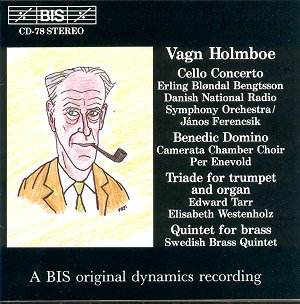Vagn HOLMBOE (1909-1996)
Cello Concerto (1975) *
Benedic Domino (1952) **
Triade (1970s) ***
Quintet (1961) ****
 * Erling Bløndahl Bengtsson
(cello)/Danish National RSO/János Ferencsik) * Erling Bløndahl Bengtsson
(cello)/Danish National RSO/János Ferencsik)
** Camerata Chamber Choir/Per Enevold
*** Edward H Tarr (trumpet)/Elisabeth Westenholz (organ)
**** Swedish Brass Quintet
rec Denmark and Sweden 1975-83 all AAD except Quintet which is DDD
 BIS-CD-78 [67.33] BIS-CD-78 [67.33] |
 |
| Crotchet
AmazonUK
AmazonUS
Amazon
recommendations |
The Cello Concerto is a work whose predominantly shadowy atmosphere
is lent contrast by the utterly characteristic (and rather Leifs-like)
hammer-strokes which move the work forward and weld together its five sections.
This is no neo-baroque exercise; on the contrary it is more a cello symphony
than a concerto in its seriousness and emerging heroic tone. Erling
Bløndahl Bengtsson is an eloquent interpreter. Nice to see the Danish
RSO conducted by Hungarian János Ferencsik. Holmboe is associated
with thematic metamorphosis as a developmental technique and it is used across
the concerto's five movements played as a single span and banded as one.
Themes are not instantly memorable but there is no lack of character and
this is not as challenging as say the Epitaph (1954). The concerto
makes a useful introduction to the composer especially in a varied recital
of this type.
Benedic Domino is one of a stream of choral settings called
Libri Canticorum written between 1951 and 1967. It is the first piece
in the 1952 set. This is sung with great sensitivity and precise aplomb.
The cool simplicity and unison lines of the writing contrasts with the forbidding
complexity of his Epitaph of 1954. This writing suggests a lightly
peppered version of plainchant. Interesting to note that Knud Jeppesen, a
great advocate of Palestrina, was one of Holmboe's teachers.
The trumpet part in Triade is richly stocked, a reverent and
proud invocation, imploring and noble. The organ's part is a touch atonal,
active, wheedling, the force dragging the music back towards earth as if
striving for a sour uncertainty. The trumpet, left to its own exalted devices,
knows only elevation and the stratosphere.
The Brass Quintet was written for the New York Brass Quintet who were
on a visit to Sweden. It was written in 1961 and was premiered in New York
in 1962. The Quintet's four movements are an aspirational poco lento
like the tempo giusto from Triade, a knockabout 'circus'
Allegro, a 'Quiet City' type Adagio and a chirpy Vivace.
The work is given a large-scale sound and performance. I might easily have
mis-guessed that this was a brass team of fifteen rather than just five if
the liner notes had not been there. Glorious playing from everyone but the
trumpets of Urban Eriksson and Kent Jonsson stand out.
Tradition in the industry is that such mixed genre collections do not sell
well. I can only hope that received wisdom is confounded by this disc.
All the works save the Quintet are analogue originals rendered as AAD. This
disc was among the earliest of BIS's CD catalogue and is collected from other
anthology discs.
Rob Barnett

